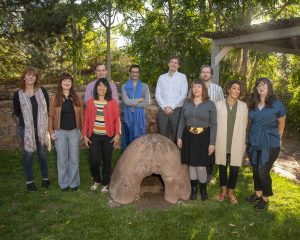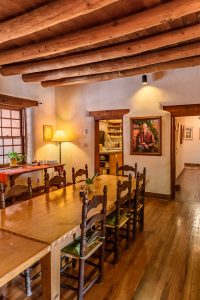Death Came Knocking on the Seminar House Door and SAR Answered
2018 Advanced Seminar “Death Culture in the 21st Century”
“When I tell people what I’m working on, often their reaction is ‘That’s kind of morbid,’ . . . but actually there is a way in which thinking about, talking about death is life affirming.” —Shannon Lee Dawdy, Professor of Anthropology and Social Sciences, University of Chicago
Exploring the world of death and mourning has always been part of anthropological work, but the opportunity to examine these topics in an interdisciplinary setting is rare in academia. This fall, SAR hosted an Advanced Seminar that enabled a cross-disciplinary dialogue among ten scholars who are currently studying death practices and their cultural relevance. Shannon Lee Dawdy and Tamara Kneese co-chaired the September 2018 seminar, and they describe how “Death Culture in the 21st Century” brought together historians, philosophers, media studies and religious studies researchers, filmmakers, and anthropologists. Dawdy explains, “We are really interested in what is happening now in the contemporary period. There are a lot of new practices that are emerging and things are changing very rapidly.” These changes include new burial practices, the influence of technology on death and dying, and in some cases a return to traditional methods of honoring and interring the dead. Discussing these ideas from multiple viewpoints helped the scholars extend their arguments in new ways.
For the last fifty years, Advanced Seminars have been a cornerstone of SAR’s Scholar Programs. These gatherings of established researchers provide them a unique opportunity to re-imagine scholarship on a wide range of subjects; often the seminar papers evolve into influential publications. Dawdy describes what she found most valuable about the week-long process:
“It is intense, but not rushed. You really have time to talk about your work in a way that doesn’t usually happen again after graduate school and your dissertation.” She emphasizes how much she appreciated the kind of in-depth feedback that seminar participants are able to provide one another for an extended period: “I don’t think there is any other place that you can really do that.”
Scholars live together for a week, and across the length of the seminar they workshop papers, share meals, and get to know each other apart from their published scholarship. Their conversations begin over morning coffee and evolve well into the evenings over glasses of wine.
Working as a scholar can be isolating, but Dawdy says of her time at SAR, “I needed what I got, which was resources . . . the informal knowledge that comes out of this . . . has been really helpful.” Kneese adds, “I think it was interesting to hear what other people found most compelling [about the work] because, when you are really close to your own work, especially when it is something that you have been thinking about for a long time, you can sort of forget what got you into the subject in the first place.”
Apart from the chance to interact with the other seminarians on an intellectual level, an Advanced Seminar offers opportunities for long-lasting connections. “It allows us to form friendships,” says Dawdy. She adds, “I think it helps create an atmosphere where we are not competing against one another.” Many seminar participants leave with fond memories of their time at SAR—memories, along with intellectual growth and friendships, that can last a lifetime. “This is an amazing institution. I hope you all go on forever doing what you are doing. And the beauty of Santa Fe and the care that the staff take. . . . I can’t remember the last time I felt so cared for.”
SAR hosts Advanced, Team, Short, and Research Seminars throughout the year.
For scholars interested in submitting a proposal see our Scholar Programs page.
Applications are due annually on February 1.
Watch the public colloquium for “Death Culture in the 21st Century” to hear more about the topics these scholars explored together:
Follow SAR on social media:

